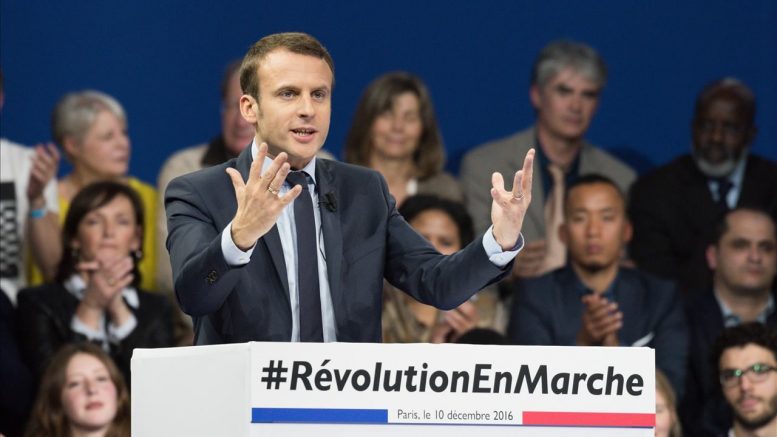Geoff Kitney poses the question: could a Macron presidency in France do what the Obama presidency in the US failed to do?
France may be about to embrace a political insurgent of an utterly unexpected kind.
If the French presidential election results in victory for Emmanuel Macron, it will be a victory for an outsider, but with a political agenda that is the antithesis of the “outsider” movement which has caused such chaos in the United States (US), Britain and elsewhere.
If Macron becomes French president in May, France will have a leader in whom much of the western democratic world will see hope for the future, a leader who embraces the modernism and optimism that the populist insurgents have rejected and from which they have promised to retreat.
It would be a remarkable victory, so starkly against the tide of anger, resentment, fear and loss of faith that Brexit and Donald Trump turned into stunning, anti-establishment political triumphs.
There was a hint in the Dutch election result two weeks ago that the so-called “sensible middle” ground of the political spectrum (where most non-partisan voters resided through the golden years of western democracy in the second half of the 20th century) was stirring to stand against right-wing, populist demagoguery.
Could a Macron presidency in France do what Obama failed to do?
A Macron victory would show that there is still a constituency to be won by leaders with the courage to stand against the cheap politics of populists who trade in ignorance, grievance and fear.
Of course, a loss for Macron to Marine Le Pen would smash this optimistic vision to rubble. Even a surprise last minute revival and victory for the right-wing social conservatism of François Fillon would be a rejection of the “sensible middle”.
Yet there is encouraging evidence that resistance to the politics of the extremes is under way.
Support for membership of the European Union has risen across Europe since the Brexit vote (including in Britain), according to a poll of 10,000 people conducted at the end of last year by the Bertelsmann Foundation. It found more than 60 per cent of those polled wanted a future inside the EU.
A separate and more recent Bertelsmann poll of the attitudes of young people in six central and eastern countries (Germany, Austria, Poland, Hungary, Czech Republic and Slovakia) found 70 per cent support for membership of the EU.
Taken together the polls confirm that, for the people to whom the longer term future is most important – young people – the idea of a collective European identity is very important. To a politician willing to stand for this future, there are potentially significant electoral rewards among younger voters.
The thing about Macron is that he appears to stand strongly for everything that the right-wing populists are against – a more integrated, more tolerant, more liberal Europe building on what has already been achieved rather than tearing it down.
A “future of Europe” coalition of young voters and pro-Europe older voters is clearly Macron’s target constituency. But he is proposing a new approach to the European project, rejuvenating the ideals of Europe by shaking up and re-energising the political system.
Macron talks in ambitious terms.
He lambasts the existing political system as corrupted by decadence and conformism. He says there has been a severe decline in the public morality, the sense of history and the human quality of leaders, as a result of the dominance of an out-of-touch professional political class.
In some ways Macron echoes the story of Barack Obama’s rapid rise to the US presidency by harnessing the power of groups who had become disillusioned with the political system and felt ignored by it, wanting change and reasons to hope for a better future.

But the tragedy of Obama’s failure to meet the expectations of those who invested their hope in him by failing to be sufficiently assertive against the vested interests that stood to lose from a bolder, braver and more confident reforming leader is a salutory lesson for those who have their hopes raised by an insurgent from the progressive side of politics.
For a young, idealistic and politically inexperienced candidate such as Macron, the challenge is to persuade and win over the “lost” young people of France who have been drawn to Marine Le Pen’s siren calls for a sort of revenge, a brutal assault on the elites by whom they feel betrayed.
But, should he win, the challenge becomes much greater for an Obama-style leader offering hope.
The parallels between the American under-classes – the poor, unemployed, futureless (and mostly black) – to whom Obama offered the promise of change and the French under-classes in desperate need of leadership which breaks from that which has failed them in France are obvious.
Whether Macron can convince enough French voters that he really does represent, not only hope, but change in a political system which has been incapable of changing for a generation will be the key.
Could a Macron presidency in France do what Obama failed to do?
His undertaking to voters is that he will reconnect politics and policy to the “dynamic sectors” of French society that are currently poorly represented in the decisions – and the decision making – of governments. These, he says, are women, workers, young people, entrepreneurs and ethnic minorities.
The polls say that French voters find this undertaking appealing – but not yet convincing.
One good definition of leadership is that it comes from those who can inspire people to believe in themselves
Conviction will only come with the offer of a persuasive case based on real policies and on convincing voters that Macron has the passion and strength to bring about real change.
The thing about the right-wing populists who have bludgeoned their way to political power and influence is that they project strength. They echo the concerns of ordinary people with the promise to represent them with the force necessary to take on the elites and the vested interests that have governed only for themselves and their own interests.
But, in every instance where it has been tried, populism that trades on the fears and prejudices of disillusioned electorates has only ended in deeper disillusionment and division.
Studies of the attributes of the most successful leaders has shown that great leaders are driven by visions of inclusion, cohesion and empathy – and the courage to stand up for their ideals and to make the change (even when it is unpopular) to achieve them.
Popularity should be the result of strong and wise leadership, not the guiding force of it.
One good definition of leadership is that it comes from those who can inspire people to believe in themselves.
This was what Trump promised – but already it is becoming obvious that his populist agenda is fake news that is selling out those who bought the promise.
After a dismal decade, the French need a revival of belief.
If Macron wins, that will be his challenge and how he responds to it will have big implications not only for France, nor even for Europe, but for western democracy.





